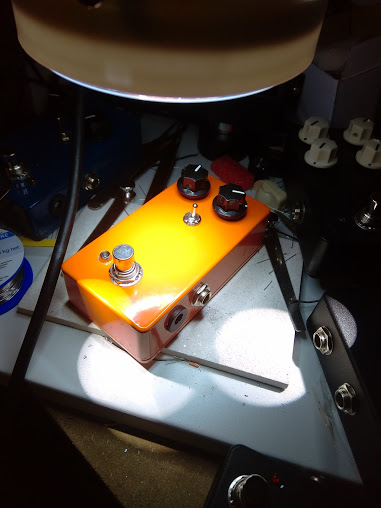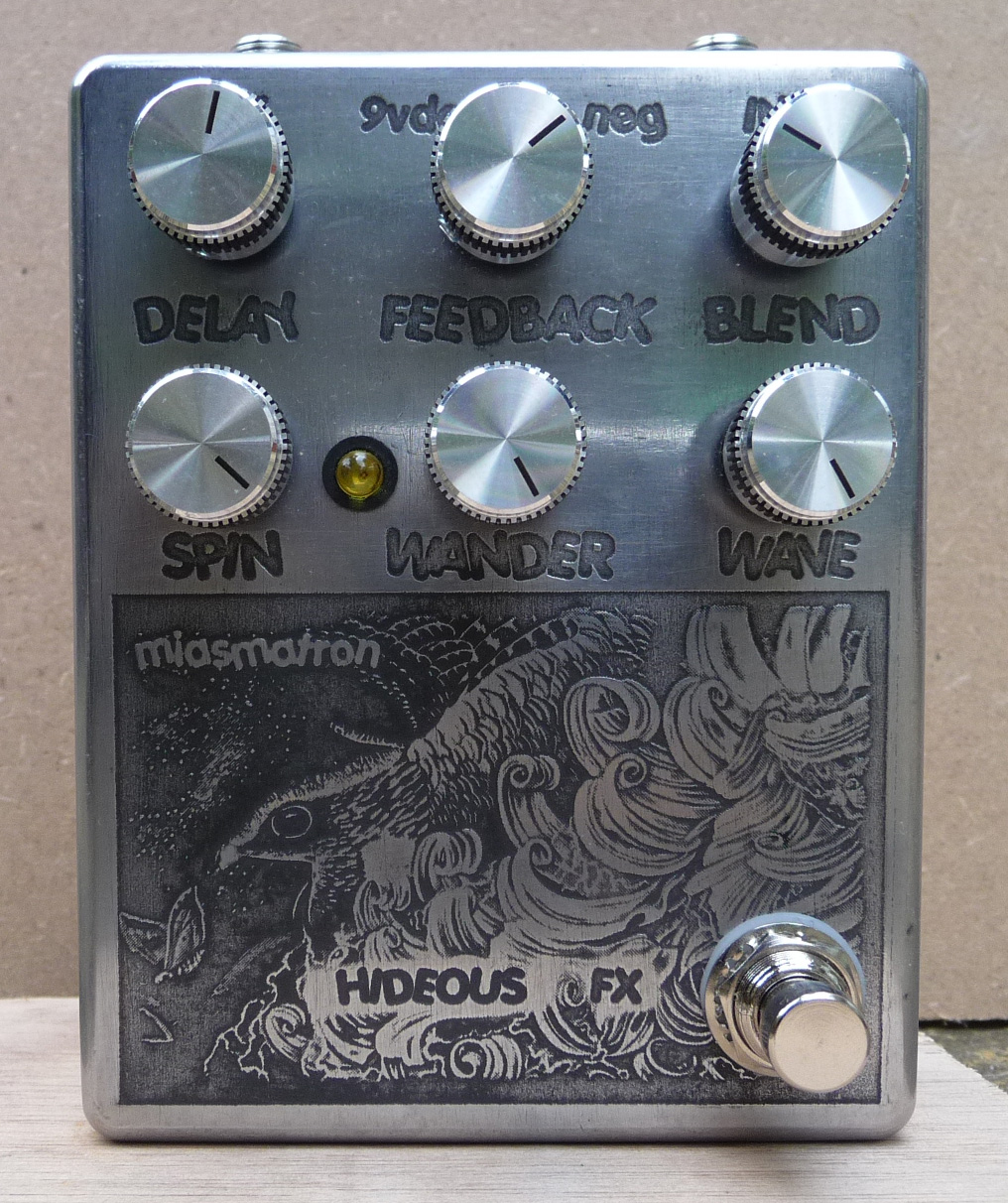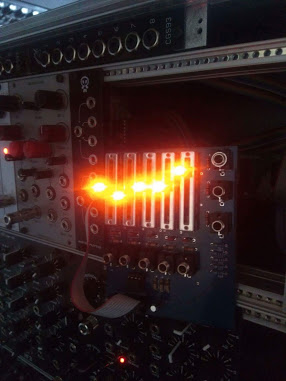Home made guitar pedals
Printed From: Progarchives.com
Category: Other music related lounges
Forum Name: Tech Talk
Forum Description: Discuss musical instruments, equipment, hi-fi, speakers, vinyl, gadgets,etc.
URL: http://www.progarchives.com/forum/forum_posts.asp?TID=111798
Printed Date: November 30 2024 at 04:05
Software Version: Web Wiz Forums 11.01 - http://www.webwizforums.com
Topic: Home made guitar pedals
Posted By: Davesax1965
Subject: Home made guitar pedals
Date Posted: August 29 2017 at 06:00
|
Just started making my own guitar pedals, more for a break from doing Eurorack kits and to save a bit of money. MXR 100 clone below, duh, drilled one hole a couple of millimetres off and the knobs look a bit goofy. However, works, hurrah !!! And cost a whole lot less than an MXR. The switch is a feedback kill switch, incidentally. So far I've made one flanger, two delays, two A <>B switch boxes. A step drill is pretty much essential, as is hem hem accurate measurement. The only fly in the ointment is that it's very difficult to do any form of graphics on the pedals, so I'm looking into that. The black box / white knobs at the back is a Mad Professor Deep Blue clone delay, waiting to be sprayed up a more interesting colour. Easy builds.... compared to Eurorack, of course. About 30 resistors, tops. Some Eurorack stuff I do has six times the amount of components. Before anyone asks, sorry, not doing these commercially. No money in it. ;-)  ------------- |
Replies:
Posted By: Davesax1965
Date Posted: August 29 2017 at 06:03
|
Deep Blue clone internals.... simple stuff, it's basically a PT2399 delay chip and op amp. The electrolytic capacitors are all laid flat to save room in the case. There's a nice daughterboard for the 3PDT switch which makes internal wiring easy - not shown in the photo. Documentation is good, but not perfect. You can get pre-drilled enclosures if you like or drill and paint your own. Most of the kits are external power only but you can get some 9v battery ones.... depending on how full the case is. Once you've built one, the wiring becomes pretty self explanatory. The potentiometers are thankfully plastic backed, so you don't get any shorts on the solder side of the PCB. Well thought out kits. And nothing very much out of the ordinary: if you can use a soldering iron and follow a BOM and schematic, these are pretty simple to do. Component density is pretty high, so you have to be accurate and take care.  ------------- |
Posted By: Davesax1965
Date Posted: August 29 2017 at 06:04
|
Vox delay clone.... These are are all from Fuzz Dog, by the way. Recommended. This took - what ? Three hours to build ??? Not for amateurs as there is NO technical support.  ------------- |
Posted By: Davesax1965
Date Posted: August 29 2017 at 06:08
|
The kits cost about £30 - 45 each, the enclosures are about £10. So, compared to the £150+ some of these pedals cost, it sounds like a commercial venture *but* you couldn't charge commercial rates, probably only about £40 on top of the price of the kit for labour. This equates to "less than £10 an hour" and then you have picky guitarists saying "it doesn't quite sound like an original / don't like the LED colour / sky's wrong shade of blue today" so, basically, there is more money to be made elsewhere with a soldering iron for less headaches. ------------- |
Posted By: Davesax1965
Date Posted: August 29 2017 at 06:13
|
They do a number of small add ons, in this case, power supply hum cancellers. Have a look at the site, recommended. This one's in the UK. http://shop.pedalparts.co.uk" rel="nofollow - http://shop.pedalparts.co.uk The Grand Plan is to get a couple of Doepfer crossfade modules in the modular synth - modulars put out a 10 volt output - pedals expect millivolt inputs or they distort like nothing on earth. So the module (a) cuts the signal from the modular down to a millivolt level and sends it on a loop to a pedalboard. Pedals do their funky thang, output goes into the RECEIVE end of the loop on the synth and is then amplified back up to modular levels again. Instant cheap effects. Given that a Eurorack phaser can cost £200 and takes up case space. Just kick the audio out to pedals instead.  ------------- |
Posted By: Davesax1965
Date Posted: August 29 2017 at 07:07
|
Oh yes. PS. For about £40, the company above will make their kits for you. Takes about four days. Have a look at the link if you're interested. UK only, I think. http://shop.pedalparts.co.uk/" rel="nofollow - http://shop.pedalparts.co.uk/ ------------- |
Posted By: pitfall
Date Posted: September 03 2017 at 14:16
|
I have been building specific pedals for local musicians for several years now and am thinking about branching out and tacking orders from further afield. Here are some of my more recent designs.  |
Posted By: pitfall
Date Posted: September 03 2017 at 14:20
|
I did post more, but only the first pic seems to be displayed. |
Posted By: irrelevant
Date Posted: September 04 2017 at 08:01
 ------------- https://gabebuller.bandcamp.com/" rel="nofollow - New album! http://www.progarchives.com/artist.asp?id=7385" rel="nofollow - http://www.progarchives.com/artist.asp?id=7385 |
Posted By: HackettFan
Date Posted: September 04 2017 at 18:40
|
I have a few kits. A couple employ Tim Escobedo's schematics, the Bronx Cheer (Synth-sounding distortion filter thing) and the Jawari (a sitar-sounding thing). I can't remember for certain where. It was either from General Guitar Gadgets or from Moosapotamus, I think it was the former. I've also purchased the parts from various vendors for Escobedo's Pulse Width Modulator schematic. I was originally intrigued by combinations of pitch-shifting and ring modulation. Later, I got interested in synth-sounding square waves produced usually by octave dividers. The MXR Blue Box does this straight out with its two octaves down setting. The Boss OC-2 also does this with both 1 and 2 octaves down when modded to bypass its filters. There are YouTube vids somewhere on the demoing it. It has a real Atari punk type of sound. I was fortunate enough to get someone to mod one for me. The octave dividers use comparators to create a very artificial sounding square wave (see Craig Anderton's Octave Divider and his Ultra-Fuzz). Modifications to the Roctave divider was the subject of alterations by someone a few years ago to create what they called a Synth Box. There was a fair amount of in-depth discussion on this and some sound files somewhere too, if they're still available. Just recently (hasn't arrived yet) I ordered a guitar synth fully assembled from a do-it-yourselfer (http://www.parasitstudio.se) called Into the Unknown. He also has a synth called an Arcadiator and another he calls a 0415 Guitar Synth. These, especially the Arcadiator, have an Atari Punk sound, but they also get a unison sound and an octave up square wave along with the octave down, and it also provides pulse width modulation and a portamento effect. The designer uses CMOS circuits to digitize the circuits. I'm currently unclear as to whether comparators are classifiable as CMOS, but the results are much alike. Arcadiator kits were sold out, but I downloaded the schematic and build documents. I was able to get a kit of the 0415. I also ordered a kit for his Theremin Fuzz, which specializes in portamento, and a kit for his Sonic Reducer, which is a bit crusher type of thing. I haven't started putting anything together yet. There are so many things to do. I plan on putting a work area together shortly, but I was away half the summer and now I'm catifying my house for two cats I just adopted. I look forward to doing some pedals, though. Thanks for the thread. ------------- A curse upon the heads of those who seek their fortunes in a lie. The truth is always waiting when there's nothing left to try. - Colin Henson, Jade Warrior (Now) |
Posted By: Davesax1965
Date Posted: September 05 2017 at 04:13
|
Wow, Pitfall, those pedals look fantastic !! Well done. I'm thinking of designing my own in the near future. As ever, the main stumbling point is the graphics. I can get them done, but at expense. It's the usual thing, do I do electronics for a wide market with low profits, or do I do something like a synthesizer add on - small audience, big profits ? ;-) ------------- |
Posted By: pitfall
Date Posted: September 05 2017 at 05:00
|
I have a number of half built projects for ring modulators and octave dividers of various sorts - but as these tend to be the larger builds, they keep getting delayed by less time consuming pedals. One that I'm currently looking at is a pedal called The Giant Hogweed by David Rolo - an octave up/down fuzz - but this one would be for myself!
|
Posted By: Davesax1965
Date Posted: September 05 2017 at 06:15
|
Sounds pretty nice. I've got a dual transformer based ring mod lying around somewhere. That's for the synth. Should work with 9v in. As for octave dividers, the Roland SH101 used a pretty simple circuit where the oscillator input was used to power a sub oscillator. The schematics are here and also a waveshaper option to produce sine wave. I believe this was copied for the Arturia Minibrute, and I'll be, hem hem, adapting it for synth designs. ;-) The plan is a two VCO synth with two multi waveform sub oscillators, similar to the ones below. Switchable 1-2 octaves down and with triangle and sine wave forms. Thinking about it, I've got a schematic to change triangle waves into square, so if I had a more indepth look into VCO waveshapers, I could have an input stage from a VCO with a waveform X, which then goes through a waveshaper or two. Sonic chaos. ;-)))) I've got a simple waveform mixer I designed attached to my modular (see pic) - I'll eventually build a 12 channel version (three op amps) using transistor white noise as well. ;-) The idea behind the "self build DIY synth" is simple. The subsystems are all redesigns of existing modular systems - VCO's, LFO's, VCF's etc. So they can be cheaply prototyped on individual small PCB's, then it's just a case of commoning them all onto one or two boards. Anyway, the sub oscillator schematic is below. http://electricdruid.net/a-study-of-sub-oscillators/" rel="nofollow - http://electricdruid.net/a-study-of-sub-oscillators/ And here's the mixer. Dig them groovy LED sliders. Which is why the panel isn't made. Easy to drill holes in metal, cutting slots is not quite as simple. ;-)  ------------- |
Posted By: Davesax1965
Date Posted: September 05 2017 at 06:23
Home brewed modular synth: 18 months with a soldering iron. ;-)
------------- |
Posted By: pitfall
Date Posted: September 05 2017 at 06:48
|
Thanks for the nice comment Dave! Yes, these days it's all about trying to find a niche in a flooded market. As I am a one man band, and do all my own designing and fabrication such as etching my own PCB's, I have to go for the low volume specialist instrument pedal market - though my long suffering partner reckons that I'm only on about £2 an hour! Something a bit different with high quality parts and build, engineered to last at least 100 years if not 200. (Well that's my sales pitch anyway). Here's an internal shot of the last pedal that I've finished.
|
Posted By: Davesax1965
Date Posted: September 05 2017 at 06:52
|
Wish I was etching my own PCBs, I get them done by PCB Express in China. £4- 5 for a 100mm square board.... but a month to arrive ! ;-) ------------- |
Posted By: pitfall
Date Posted: September 05 2017 at 06:56
|
|
Posted By: Davesax1965
Date Posted: September 05 2017 at 07:12
|
Excellent ! ;-) ------------- |
Posted By: pitfall
Date Posted: September 05 2017 at 07:47
|
A lot of the techniques and tools for etching PCB's is the same as for doing etched enclosures - but it's a bit of an art involving quite a lot of expensive trial and error. It's worth doing but is time consuming, especially if you'd rather be making/recording music.
|
Posted By: Davesax1965
Date Posted: September 17 2017 at 09:33
 All working so far ! Deep Blue delay, Vox chopper delay, MXR phaser clone and two A <> B switch boxes. On the way, another two delays and a Harmonic Energiser. They're all fairly simple to build, the wiring can be tricky and these particular designs mean giving them a once over with a soldering microscope to check for solder bridges is essential. Lots of components in a small space. ------------- |
Posted By: Davesax1965
Date Posted: October 14 2017 at 04:21
|
Minibrute arpeggio, delay and flanger. ;-) https://soundcloud.com/brotherhoodofthemachine/brute-echo-flange" rel="nofollow - https://soundcloud.com/brotherhoodofthemachine/brute-echo-flange ------------- |
Posted By: Atavachron
Date Posted: October 14 2017 at 04:30
|
Kick ass ~ ------------- "Too often we enjoy the comfort of opinion without the discomfort of thought." -- John F. Kennedy |
Posted By: Davesax1965
Date Posted: October 15 2017 at 10:05
|
Thanks !! ;-) Well, with three audio generators and a modular synth, plus five other analogue synths, you can imagine the sonic catastrophe which should ensue. Regarding the "soldering microscope" - this fine beastie is currently what I use to solder bits of weird junk up. It's had a few more bits added to it and currently has a camera mount on it displaying the output to a 24 inch monitor in the garage. After a minor stroke aged 50 (blood clot moved under physio from my back to my brain) I've pretty much got to use one of these. Fine now, 99 per cent recovered, I was very lucky indeed.  ------------- |
Posted By: Davesax1965
Date Posted: October 20 2017 at 02:22
Looks like whole shedloads of pedals are going to be connected up (using attenuators) to my 1960's valve oscillators. 1970's Hawkwind and Cluster, here we come. ;-) ------------- |